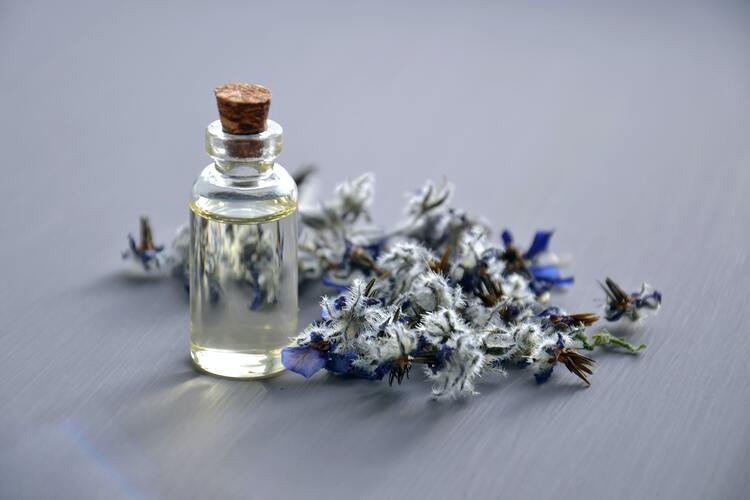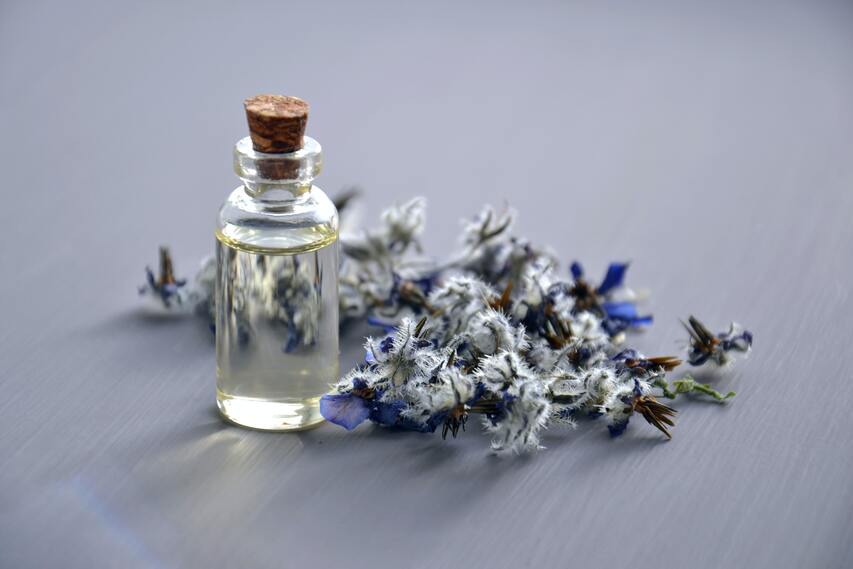What essential oils are best for healthy hair?

Whether it's hair loss, itchy scalp, hair thinning, or damaged hair, we're all looking for ways to tackle hair-related problems and promote healthy, voluminous tresses. If you've been searching for ways to step up your hair care game, don't forget about essential oils. We've chosen the top 5 essential oils for hair. Learn which oil suits your hair based on its effectiveness and your desired hair goals.
What are essential oils?
Essential oils are highly concentrated plant extracts obtained through distillation or mechanical pressing. They capture the plant's flavor and scent and are uniquely aromatic. Each essential oil has a different composition of chemicals, and this variation affects the absorption, smell, and effect on the body.
Humans have been using oils for various medicinal and cosmetic reasons for centuries. One benefit of some essential oils is improving hair health. Different oils can do everything from helping hair grow to adding shine and improving overall strength.
How can essential oils benefit the hair?
Essential oils have many benefits for skin and hair. The leading hair perks include stimulating hair growth, reducing dandruff, nourishing hair, controlling oiliness, and decreasing hair loss.
The best essential oils for hair health
People have used essential oils for hair care for many years due to their moisturizing, soothing, and enriching properties. Instead of relying on expensive products that promise hair growth and repair with a long list of questionable ingredients, why not turn to natural ingredients with expert-backed research?
Lavender essential oil for hair growth
Lavender essential oil is often cherished for its relaxing scent - and your hair will love it just as much! Lavender has antibacterial and antifungal properties that keep the scalp and hair shafts clear of growth-inhibiting bacteria. This can combat scalp conditions such as dermatitis and dandruff. Since lavender oil is one of the more gentle oils, it can be used on sensitive skin with minimal side effects.
When used in the hair, lavender oil can also be used as an aromatherapy tool to calm the senses, relieve stress, and balance hormones. Three types of hair loss are associated with high stress levels: telogen effluvium, trichotillomania, and alopecia areata. Since lavender reduces stress and cortisol (stress hormone) levels, it can also be a natural remedy for stress-induced hair loss.
Cedarwood essential oil for reducing hair loss
Cedarwood essential oil is made from various parts of the cedar tree. It has a wonderfully earthy smell and is often touted as a potent anti-inflammatory, antifungal, and antiseptic - making it an excellent addition to any beauty regimen! It can stimulate hair follicles and fight hair loss, promote hair growth, and even help those facing alopecia areata.
Topical application of cedarwood essential oil can tighten the scalp's follicles to prevent further hair loss or thinning. By fighting bacterial build-up on the scalp, cedarwood also encourages the appearance of increased hair volume and promotes hydration to transform dry, lifeless hair.
Rosemary oil for thicker hair
Rosemary essential oil offers primary health benefits such as anti-inflammatory properties, nerve growth promotion, and improved circulation. It enhances cellular generation, which leads to thicker, stronger, and healthier hair. Using rosemary oil regularly can reduce hair breakage and promote overall scalp wellness.
Studies have shown that rosemary oil performs just as well as Minoxidil (a popular over-the-counter hair loss medication) when massaged into the scalp daily. It has also been shown that rosemary can protect against future hair loss and regulate oil distribution by repairing and stimulating cells.
Pumpkin seed oil
Pumpkin seed oil is one of the most effective oils to support new hair growth. It is believed to block the effect of male hormones (DHT) on the hair follicle, reducing miniaturization typical to androgenetic hair loss in women. In addition, pumpkin seed oil also contains vitamin E and fatty acids that act as antioxidants and anti-inflammatory agents - improving scalp health. In one 2021 study on female pattern hair loss, pumpkin seed oil worked nearly as well as minoxidil foam in promoting hair growth. In this study, 30 women used Minoxidil for three months, and 30 more used pumpkin seed oil. The researchers found that pumpkin seed oil reduced hair shaft width diversity, a sign of new hair regrowth.
Peppermint essential oil for improved scalp circulation
Peppermint is fresh, stimulating, and uplifting. When applied to the skin, it has a cooling effect, can increase local blood circulation, and reduces dryness, itching, and other unwanted scalp problems. Increased blood flow to the scalp is especially beneficial for hair growth during the anagen phase, as it helps deliver essential nutrients and oxygen to starved hair follicles.
If you struggle with oily hair and scalp, peppermint essential oil is also great for helping "train" your hair into shampooing it less often while balancing oil (sebum) production. By clarifying and invigorating the hair without stripping it of its necessary oils, peppermint oil can balance the scalp's sebum production while nourishing the hair.
Tea tree essential oil for cleansing hair and scalp
Tea tree essential oil is the jack of all trades for natural skincare. Tea tree oil can combat acne vulgaris, cure sweaty feet, and even freshen up your toothbrush thanks to its powerful cleansing, antibacterial, and antimicrobial properties. It also does wonders when it comes to scalp health! Tea tree oil is widely used to combat infections and cure dandruff - it can open up clogged hair follicles to improve hair growth, cure scalp acne, and wash away product build-up on the hair. Tea tree oil can nourish the hair's roots, promoting fullness and flowing locks when applied to the scalp.
How to use essential oils in the hair
A little goes a long way when using essential oils, which should always be used in their diluted form. You can mix one or more types of oils into your shampoo or conditioner for a subtle transition. For a full experience, you can create your own DIY treatment or hair mask by mixing a few drops of your oil of choice into 2 - 4 ounces of carrier oil. A carrier oil can include:
- Olive oil
- Coconut oil
- Jojoba oil
- Grapeseed oil
- Avocado oil
- Almond oil
Massage the essential oil mixture into the scalp using circular motions for 2 - 3 minutes. Dip your fingers into the mix and work it into the scalp's sides, back, and middle. Use gentle but firm pressure when applying essential oils to help stimulate blood flow to the scalp. Say hello to natural, healthy hair!
What is the best plant-based hair growth serum for women with hair loss?
The best non-medicated plant-based serum for your scalp should:
- Block DHT and prevent dermal fibrosis in the scalp
- Stimulate blood flow by vasodilation of the capillaries
- Reduce inflammation
- Reduce the resting phase of the hair cycle and restart the anagen (growth) phase of the hair follicle.
Best scalp serum with rosemary leaf and pumpkin seed oil extract
Best shampoo with Rosemary leaf oil extract rosemary leaf and pumpkin seed oil extract
Best conditioner with rosemary leaf oil extract Rosemary leaf and pumpkin seed oil extract
References
- Randomized trial of aromatherapy. Successful treatment for alopecia areata
- Hair Growth-Promoting Effects of Lavender Oil
Find the most effective hair growth products for you by taking the free hair assessment.




